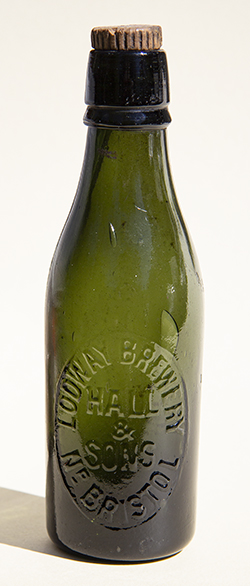
Glassworks: P & R, B on base (Powell & Ricketts, Bristol) Dark green glass.
William Hall was born in Somerset around 1796/7, he was a maltster at Portbury when he married Miriam Hathway of Chipping Sodbury, at St. Paul's, Bristol, on 16 December 1826. A witness to the marriage was John Clutterbuck Hall of Guinea Street, Redcliff, Bristol, who was born in Wotton-under-Edge c.1791, son of shopkeeper John Hall, and likely William's brother. William remained a maltster in Portbury until at least the birth of his daughter Miriam in 1837, but by 1841 he was a brewer and maltster at St. George's Lodway.
William and Miriam had children born and baptised in Portbury: William Hall b. 26 Jan. 1828, bapt. 30 Dec. 1828; Joseph Hall b. 10 Aug. 1829, bapt. 13 Sept. 1829, bur. 10 Feb. 1830 age 5 months; Joseph Hathway Hall, b. 6 May 1831, bapt. 22 Jan. 1832; Ann Hall, b. 10 Feb. 1833, bapt. 17 Mar. 1833; Elizabeth Hall, b. 29 May 1835, bapt. 28 June 1835; Miriam Hall, b. 5 Aug. 1837, bapt. 3 Sept. 1837. The last daughter Harriet was baptised in Easton-in-Gordano on 23 Aug. 1843.
From the Bristol Times and Mirror - Saturday 6 October 1849 page 5: "Deaths...Sept. 19, at St. George's near Pill, of apoplexy, age 53 years, William Hall.
Miriam Hathway was born in Wapley, South Gloucestershire in 1804, baptised at St. James the Great, Westerleigh on 2 Sept. daughter of William and Ann Hathway. She was bequeathed the Lodway Brewery and malting business in her husband's will in 1849 in order to carry it on, with assistance from the executors who were other members of the Hathway family.
The Will of Miriam Hall late of Court House, Lodway, in the Parish of Easton-in-Gordano in the County of Somerset, Widow, who died 5 December 1887 at Court House, was proved at Bristol by William Hall, of Keswick House, Lodway, Brewer, the Son, and Samuel Hardwick, of Court House, Yeoman, the Executors.
From the London Gazette - 12 March 1872, page 1423: "NOTICE is hereby given, that the Partnership heretofore subsisting between us the undersigned, William Hall and John Hall, under the firm of W. and J. Hall, as Brewers, Maltsters, and Wine and Spirit Merchants, at Lodway, in the county of Somerset, has this day been dissolved by mutual consent. All debts due to or owing from the said late firm will be received and paid by the said William Hall.—Dated this 9th day of March, 1872. William Hall. John Hall."
William Hall married Ann Gibbs at Westerleigh St. James the Great on 25 Feb. 1858.
Samuel Hardwick was born in Portbury on 29 Oct. 1826, baptised at Portbury 5 Oct. 1828 son of William and Mary Hardwick, he married Elizabeth, daughter of William & Miriam Hall, on 21 April 1858 at Easton-in-Gordano.
Thomas Wall Hardwick was born in Barrow Gurney about 1834, baptised at Barrow Gurney on 7 Jan. 1835, son of Thomas Hardwick and Eliza Wall who married by license in Congresbury on 10 June 1830. Thomas, brother Charles and sister Louisa, left Barrow Gurney for Congresbury in 1860, upon which they were presented with a silver plate teapot, sugar basin and cream ewer by the inhabitants as a token of esteem. Thomas was a farmer at this time, as he had been in Barrow. On 26 April 1862 Thomas Wall Hardwick, of Lower Court, Ashton, married Mary Smith, eldest daughter of the late Abraham Baker Esq. of Park Row, at St. Augustine's, Bristol. Thomas joined the Beaufort Lodge of Freemasons in 1867. At that time he was an Auctioneer at Long Ashton, Somerset.
From the London Gazette - 19 March 1869 page 1830: "NOTICE is hereby given, that the Partnership heretofore subsisting between us the undersigned, Thomas Wall Hardwick and George Nichols, both of Long Ashton, in the county of Somerset, Land and Estate Agents, Surveyors, Valuers, and Auctioneers, under the style or firm of Hardwick and Nichols, is dissolved by mutual consent, as on and from this 12th day of March, 1869, and that all debts owing to or from the said partnership are to be received and paid by the said George Nichols, by whom alone the said business will be in future carried on.—Dated this 12th day of March, 1869. Thomas Wall Hardwick. George Nichols."
The following year Thomas was involved in Hardwick & Co. Ltd of the Ashton Gate Brewery. where Thomas, in 1871, was the brewer living with his family at Baynton Buildings, Long Ashton. Here he was a director along with Henry Hardwick of the Grange, Congresbury and others. This company lasted at the brewery until 1883.
From the Western Daily Press -
Wednesday 12 January 1881 page 7: "A SINGULAR POINT UNDER THE LICENSING
ACT. At the police court, yesterday morning, before Messrs H. Taylor and
F. J. Fry, Joseph Hodgson, of the Coach and Horses, Silver Street, was
summoned by Inspector Wedmore for that he, being a convicted thief, and
was thereby disqualified from selling spirit by retail, unlawfully did
sell certain spirit, to wit, rum, to one John Rowland. He was also
summoned for that he, having previously been convicted, and was thereby
unqualified from selling beer retail, unlawfully did sell beer to John
Rowland.
Poole (instructed by Mr Benson) was for the defence, and contended that
the defendant had not been guilty of any offence against the Act. About
two years ago he was, whether rightly or wrongly they could not discuss
now, convicted a receiver, otherwise his character was free from blame any
kind. In consequence of that conviction he became incapable of holding
license, and Messrs Hall and Hardwick, brewers, knowing the man, and being
desirous that he should not be thrown on the world without a business of
any kind— this public-house business being the only one with which was
acquainted—they put him into one of their establishments, for which they
held a license, to manage it for them. He argued that the man was not
liable in this case, because be was not selling for himself. It was not a
question of tort, but a question of contract, and it was clear that the
defendant was not the responsible person, but simply a servant of Messrs
Hall and Hardwick. The license was in the name of Mr Thomas Wall Hardwick,
and that name was over the door. The question might be tested this way.
Who would be liable to be sued if goods used at the house were not paid
for? Certainly not the defendant.
The magistrates' clerk (Mr Gore) said the person who should have been
licensed was the defendant, who conducted the business. If Mr Poole's
contention was correct, a firm of brewers could take any number of houses
and put felons into them managers. It was never disclosed to the
magistrates the defendant was to manage the house. If it had been
disclosed they would have said he could not manage it.
Mr Poole thought the law wished to have a responsible person, and here
they had Mr Thomas Wall Hardwick.
Mr Gore said he remembered a case where a man who received stolen property
amassed £60,000, and under the cloak of managing a tavern an immense
amount receiving business could be carried on.
Mr Poole believed the magistrates could soon put a stop to that sort of
thing.
Mr Gore doubted they could, if Poole's contention was correct.
Mr Poole said if there was conviction should ask for a case.
Mr Gore replied that in that case the facts of the case had better be
properly stated in evidence.
John Rowland said on the 6th inst., at ten minutes past eight in the
evening, he called at the Coach and Horses, Silver Street, and there saw
Hodgson behind the bar, and told him he wanted three pennyworth of warm
rum. Another officer who accompanied witness ordered a of sherry, but
defendant said be could not serve it, as he had no wine license. The other
officer then had a glass of ale. Another constable came into the house and
had a glass of gin. Witness asked the defendant what he would take, and he
said "Nothing,'' and added that he was a teetotaller. Witness paid for the
whole of the liquor. He had known Hodgson for more than 20 years. He knew
that he was licensed that house in 1878. He returned to the house at the
latter part of 1880. The public-house was close to the police station.
Hodgson held a license in Temple Street some years ago.
P. C. Harford gave corroborative evidence.
Detective Blacker, who also give corroborative evidence, said the
defendant was convicted of receiving goods at the Coach and Horses.
Inspector Wedmore stated that the license was granted to Messrs Hall and
Hardwick six months before the defendant came out of prison.
Mr Thomas Wall Hardwick, called by Mr Poole, said the defendant was in
charge of the business for their firm. was paid £1 a week and 5 per cent,
on the takings of the house. The Hope and Anchor, Redcliff Hill, and the
firm's hotel at Portishead, were managed in the same way. In those cases
the managers were licensed. He knew the defendant well, and had the
greatest confidence in him. He wished to give him chance of redeeming his
character, and on bis leaving prison put him into the business. He had had
in his employ a servant who, 18 years ago, was convicted felony; he
employed the man on his leaving gaol, and a better servant he could not
have had. If the man of whom spoke had been thrown on the world he would
probably have become thief.
Mr Gore said the question was whether the law permitted Hardwick to carry
out his kind arrangement. The magistrates reserved their decision till
Friday to consider the matter."
...and from 19th January: "The decision was as follows :—Having carefully considered this case we have come to the conclusion that there must be a conviction. The object of the section under which this action has been taken is evidently to protect the public, and to preclude the possibility of a person convicted of felony from selling liquors in any manner whatever; these words apparently being inserted to prevent any escape through any limited or special meaning of the word "sell." The defendant has rendered himself liable to a penalty of £50, but under the circumstances, the offence may have been committed in ignorance of the law, we shall only inflict a penalty of 20s and costs. —Mr Poole asked the bench to grant a case upon their decision.—Mr Gore (magistrates' clerk) pointed out that it would be better for Mr Poole to make his application in writing. Mr Fry said was desirable, if there was doubt the matter, that it should be cleared up in the interests of the public."
From the Western Daily Press - Wednesday 23 September 1885 page 4: "THE BANKRUPTCY ACT, 1883. BANKRUPTCY. Notice is Hereby Given, that on a petition dated the 17th September, 1885, a Receiving Order against THOMAS WALL HARDWICK, formerly of Lodway, in the parish Pill, in the county Somerset, then of Limpley Stoke, in the county Wilts. Brewer, but now No. 63, Broad Street, in the city of Bristol, and Hengrove House, in the parish of Brislington, in the said county of Somerset, Auctioneer, was made by the County Court of Gloucestershire, holden at Bristol, on the 19th September, 1885. The FIRST MEETING of CREDITORS will be held at the OFFICES of the Official Receiver in Bankruptcy, BANK CHAMBERS, Bristol, on the 30th September, 1885, at 12.30 o'clock. Proofs of Debt to be used at such meeting must be lodged with me on or before the 28th day of September, 1885. Proxies must be lodged by the 29th day of September, 1885. The PUBLIC EXAMINATION the Debtor is to be held on the 9th October, at 12 o'clock noon, at the GUILDHALL. Bristol. EDWARD G. CLARKE, Official Receiver. 22nd September, 1885."
From the Central Somerset Gazette -
Friday 13 February 1925 page 2: "UNIQUE BANKRUPTCY CASE. The "Bristol
Times & Mirror" publishes some particulars of a remarkable bankruptcy
case which is believed to be a record, when the whole of the circumstances
are taken into consideration. Forty years ago—in October, 1885—a receiving
order was made in the Bristol Bankruptcy Court against Mr. Thomas Wall
Hardwick, brewer, of Lodway, Pill, and later of Limpley Stoke;
subsequently auctioneer of 63, Broad Street, Bristol, and Hengrove House,
Brislington. He went off to Australia, and the trustee, Mr. Stephen Tryon,
paid to the creditors dividends amounting to 5s. 7½d. in the pound on
debts amounting to several thousands of pounds. Mr. Tryon eventually
obtained release from the trusteeship, and the Official Receiver became
trustee under the provisions of the Bankruptcy Act. Hardwick, trading as a
brewer, prospered in Australia, and when he died at Perth, in November,
1917, he left an estate valued at many thousands of pounds. The fact that
a cheque for a legacy had been received in Bristol became known to the
then Official Receiver, who took prompt steps with a view to preventing
the distribution of the debtor's estate.
When Mr. F. W. Darley became Official Receiver he instructed Mr. W. H.
Brown to act in the matter, with the result that elaborate legal
proceedings were conducted here and in Australia, and the Official
Receiver obtained possession of the estate from Hardwick's trustees. The
happy closing chapter of this unique story is that all the creditors of
Hardwick have now been paid in full, with interest, except in cases where
they waived their right to anything beyond the actual amount of the debts.
Mr. Brown will attend at the Bristol County Court shortly for the purpose
of making application—an extremely unusual one—for the annulment of the
bankruptcy of a man who has been dead for some years, and whose debts have
been liquidated since he passed away. This notable case illustrates the
importance of all bankrupts obtaining their discharge, and thus
safeguarding any assets that they may accumulate later on in life."
From the London Gazette - 31 March 1882 page 1485: "NOTICE is hereby given, that the Partnership heretofore subsisting between us the undersigned, William Hall and Thomas Wall Hardwick, carrying on business as Brewers and Wine Merchants, at Lodway, in the county of Somerset, under the firm of Hall and Hardwick, has this day been dissolved by mutual consent. All debts due to or from the said firm will be received and paid by the said William Hall—Dated this 21st day of December, 1881. William Hall. T. W. Hardwick."
From the Western Daily Press - Friday 22 February 1884 page 8: "Married...Hall—Parker.—Feb. 20, at St. George's Church. Richard Gibbs Hall, second son William Hall, Esq.. Keswick House, Lodway, to Alice Mary, daughter of the late Rev. Charles W. Parker, vicar of Downton."
After the departure of Thomas Wall Hardwick the brewery reverted to the Hall family, as Hall & Sons, with Joseph Hall, born 14 October 1864 in Lodway, son of William Hall and Ann Gibbs. Joseph's mother died in 1874, his father marrying again:
From the Western Daily Press - Thursday 18 May 1876 page 3: "Wedding at St. George's, near Pill.—Yesterday the village of Pill and the neighbourhood presented animated appearance, on the marriage Mr William Hall, of the Lodway Brewery, to Miss Sarah Ann Wilde, only daughter Mr James Wilde, of the same place. The ceremony was performed by the Rev. A. Walker. The bride, who was given away by her father, was attired in a white corded silk dress, with orange blossoms, and tulle veil. The bridesmaids, who were dressed in cream-coloured muslin, with blue forget-me-nots, were Miss Hall, Miss Wilde, Miss Knight, and Miss Hardwick. Flags, with arches of evergreens, were to be seen in many parts the village, the bells rang a merry peal. During the afternoon the bride and bridegroom left for London, en route for Scotland. In the evening a supper was given to all the workmen employed by the bridegroom's firm, the same being provided by Geo. Wilton, of the King's Head Inn, Pill."
Joseph spent much of his childhood at boarding schools, but he was a brewer back in Lodway, assisting his father by 1891 along with brother William as "Hall & Sons".
From the Bristol Times and Mirror - Saturday 14 May 1892 page 16: "Died...HALL—On May 9, at Keswick-house, Lodway, Pill, of diphtheria, William (Willie), eldest son of William Hall, aged 33 (no cards)."
Joseph married Ethel Wilde at St. Saviour, Southwark, Surrey on 16 Aug. 1893 eventually running the company as J. H. Hall & Co. from 1907 until it was bought out by The Bristol Brewery Georges & Co. Ltd. in 1912. Ethel died in 1903 and Joseph married again to Dorothea Charlotte Annie Andrews at St. Mary Abbots, Kensington in July 1906. Joseph died at Hunter's Lodge, Church Road, Sneyd Park, Bristol, on 29 April 1933, leaving his estate to sons Richard Stuart Hall and John de Souza Hall, brewers.
William, Joseph's father died in 1901, from the Bristol Times and Mirror - Saturday 9 February 1901 page 6: "FUNERAL OF MR. WILLIAM HALL, OF LODWAY. Yesterday afternoon the remains of Mr. William Hall, of Keswick House, Lodway, and head of the Lodway Brewery, were laid to rest in the picturesque churchyard of St. George's, Easton-in-Gordano. The body was conveyed from his residence to the church in an open funeral car. The chief mourners were Mrs. W. Hall (widow), Mr. Joseph Hall and Mr. Frank Hall (sons), Miss Edith Hall (daughter), Mrs. Joseph Hall, Mrs. Richard Hall, Mr. Samuel Hardwick, Mr. A. Hardwick, Capt. Lovell & Dr. Morgan. The funeral was also attended by the staff of the brewery, both out and in-door, and a large number of the deceased gentleman's tenants and friends. (...list of many of these). The clergy met the funeral party at the churchyard gate and led the way to the church... The coffin bore the following inscription "William Hall, born January 19 1828, died February 4th 1901."
"Frank" was Francis George Hall, son of William Hall and Sarah Ann Wilde, baptised at Easton-in-Gordano on 24 Feb. 1882. After his father's death, he was working as a brewer in the family concern whilst still at school. He died on 12June 1927 at Keswick House, leaving his considerable estate to his brother Joseph and Richard Stuart Hall (nephew and son of Joseph & Ethel), brewers.
| Half Pint Beer Bottle |  |
| Embossed:
(in circle) LODWAY BREWERY / NR BRISTOL (in
centre) HALL / & / SONS Glassworks: P & R, B on base (Powell & Ricketts, Bristol) Dark green glass. |
| 2 Gallon Stoneware Flagon | 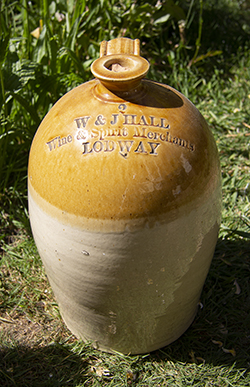 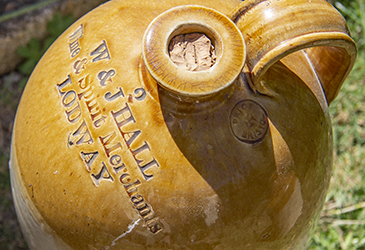 |
| Impressed:
2 / W & J HALL / Wine & Spirit Merchants / LODWAY Potter: Price + Bristol |
| 1 Gallon Stoneware Flagon | 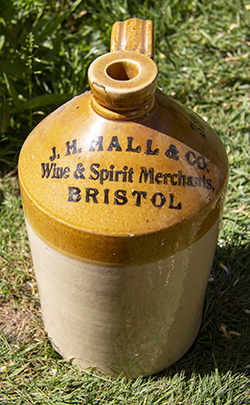 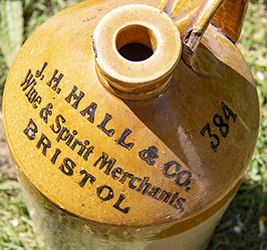 |
| Printed:
J. H. HALL & CO. / Wine & Spirit Merchants, / BRISTOL 384 (on shoulder). Potter: Price / J / Bristol |